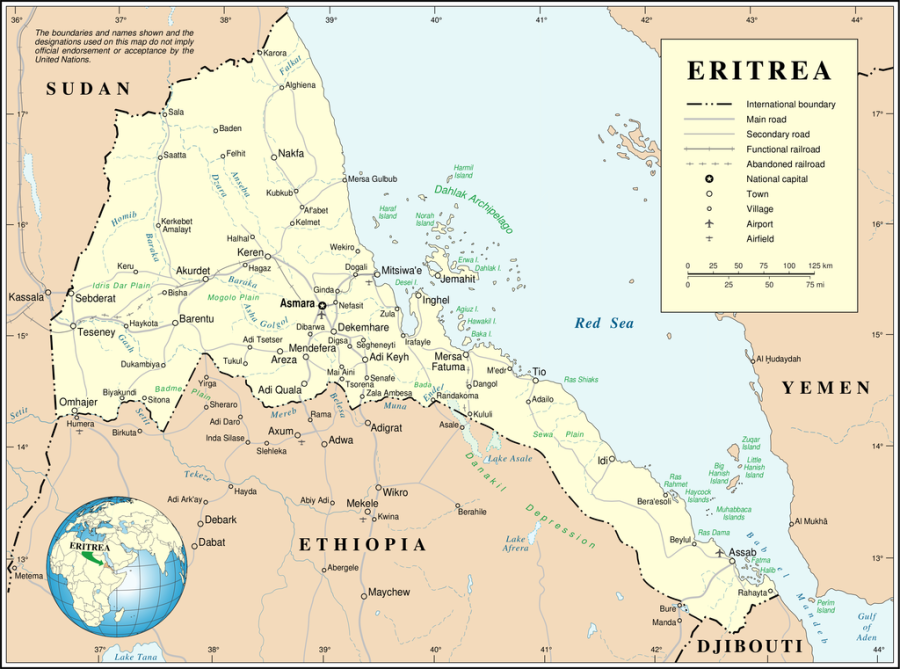The Curious Case of Eritrea’s National Soccer Team(s)
On October 15, last Wednesday, 10 members of the Eritrean national soccer team refused to board their flight. They were due to fly from Botswana, where they had played and lost a qualifying match for the World Cup, back to Eritrea. In a move that may seem surprising to those who don’t follow the politics of the horn of Africa, a large portion of the team simply refused to go home.
Rather than return to their home country, an impoverished nation of 6 million that achieved independence from Ethiopia in 1991, the team members chose to leave their entire lives behind and apply for asylum in Botswana, a country located in southern Africa. While it is very common to hear of people leaving African countries to seek better lives in Europe, it is not at all common to hear stories in which refugees request asylum in another African country. Not to mention the fact that, in this case, almost an entire team defected. Interestingly, though, this isn’t even what is most remarkable about the Eritrean national soccer team.
What is most remarkable about this story is not how rare it is, but how common it is.
9 team members disappeared after a match in Kenya in 2013. In 2012, the entire national team defected during a tournament in Uganda. 13 team members remained in Tanzania after playing there in 2011. Twelve failed to board their flight out of Kenya in 2009. 6 members sought asylum after a match in Angola in 2007. Another twelve did so earlier that year in Tanzania. And, in 2006, four defected in Kenya.
It is because of these almost constant defections that the case of the Eritrean national soccer team is quite unique indeed. What, though, compels so many people to leave their entire lives behind? While these defections may seem merely a curiosity to a casual observer, in reality they are a reflection of the horrendous state of human rights in Eritrea. Allegations of humans rights abuses were so severe that the Human Rights Council of the United Nations commissioned an inquiry to investigate the state of affairs in the country. It’s report, released earlier this year, reveals a dire situation.
Despite being barred from accessing the country, the investigation uncovered that “systematic, widespread and gross human rights violations have been and are being committed in Eritrea under the authority of the Government.” The authors of the report go so far as to claim that some of the human rights violations constitute crimes against humanity. The report goes on to detail three main domains in which human rights are violated.
The first domain describes the methods of the government to control the population through the restriction of civil liberties. The report claims that the freedoms of privacy, movement, expression, and religion are all denied by the government. In order to control the people, the government has instituted a massive surveillance program to collect information on its citizens. It has also put in place a system of ‘travel passes’ that prevents ordinary citizens from traveling within and outside the country. Finally, any of the government’s perceived ideological threats are suppressed. Because of this, only four religious denominations are authorized, and the country has received the lowest press freedom rating from Reporters Without Borders.
Eritrea’s government also uses deeply abusive tactics to control people through what the report’s authors call “rule by fear.” The report details a dysfunctional judicial system in which civilians are arrested for unexplained reasons and denied trial. Government sponsored kidnappings and extrajudicial killings are also widespread. Eritrea is also known internationally for its ruthless system of prison camps. Not only has this system been compared to that in North Korea, but the report claims that the camps are “characterized by unspeakable hygienic conditions” in which “detainees are sometimes forced to sleep in human waste.”
Of all the crimes committed by the Eritrean government against its people, what the athletes are most likely fleeing from is explained in a third section of the United Nations report. This is a system of forced labor through military conscription, and it is one of the most internationally infamous policies of the Eritrean government. Under this arrangement, all Eritrean citizens must serve in the military for indefinite periods of time. While mandatory military conscription of a short period is not uncommon, the United Nations report has found that “during their service, most conscripts in the military and all conscripts in civil service are subject to forced labour,” and that “there is a pattern of torture, inhuman, cruel or degrading treatment or punishment of conscripts in the army in connection with the labour that conscripts are forced to perform.”
Considering the cruel, oppressive, and abusive state of affairs in modern Eritrea, it is not surprising that athletes choose to flee the country when given a chance. The abuses explained above also explain why Eritreans make up the second largest nationality of migrants entering Europe despite coming from a country that is not marred by war like Syria and Afghanistan, which are first and third respectively.
While the spectacle of an entire team simply refusing to board its flight back home may seem bizarre, it simply illustrates the desperate situation of the citizens of Eritrea. When one becomes aware of this situation, though, it becomes clear that it is not the actions of the teams that are extraordinary, but the brutality and injustice of the Eritrean government.
Sources: The Guardian, Sudan Tribune, Wikipedia, United Nations















